2023年中考英语复习 第2部分 第11章 句子种类与简单句课件(共38张PPT)
文档属性
| 名称 | 2023年中考英语复习 第2部分 第11章 句子种类与简单句课件(共38张PPT) |
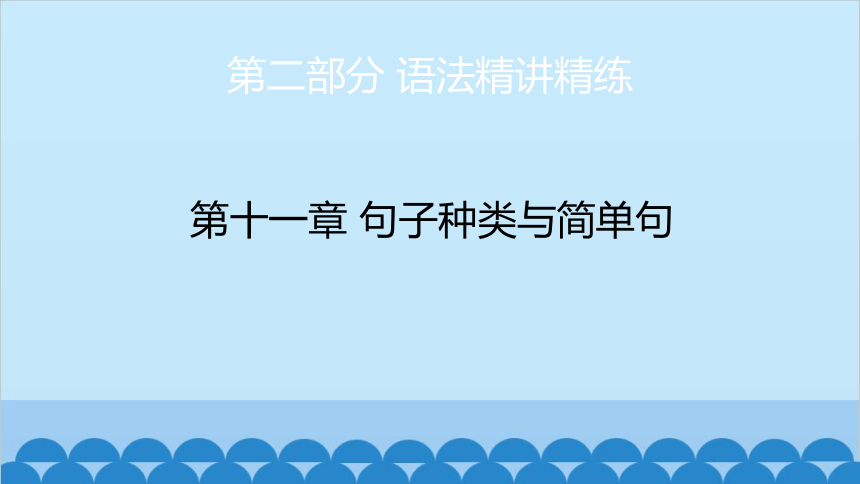
|
|
| 格式 | pptx | ||
| 文件大小 | 211.5KB | ||
| 资源类型 | 教案 | ||
| 版本资源 | 人教新目标(Go for it)版 | ||
| 科目 | 英语 | ||
| 更新时间 | 2023-06-09 15:45:12 | ||
图片预览




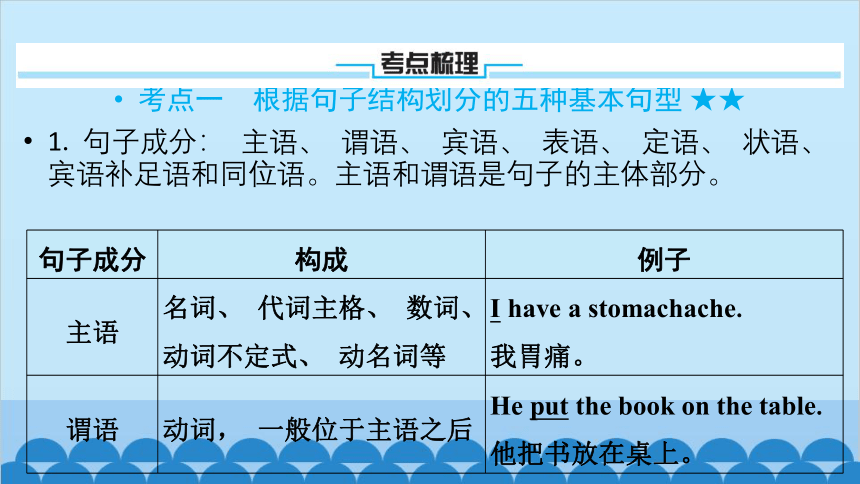
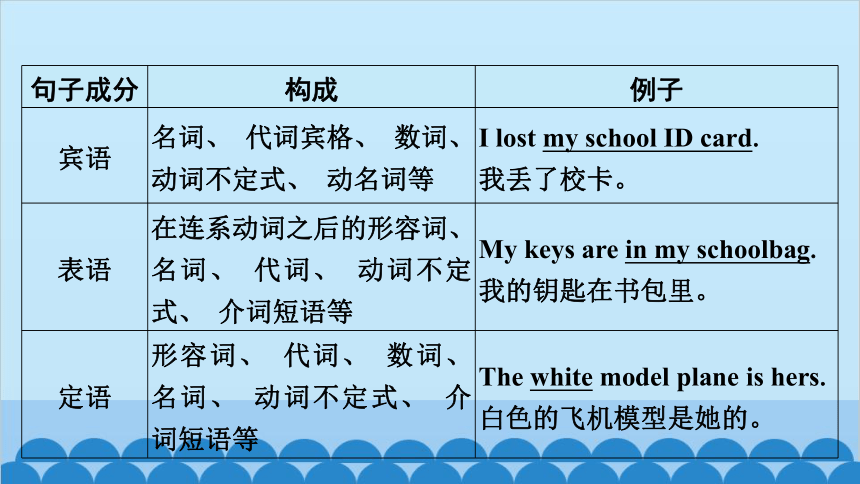
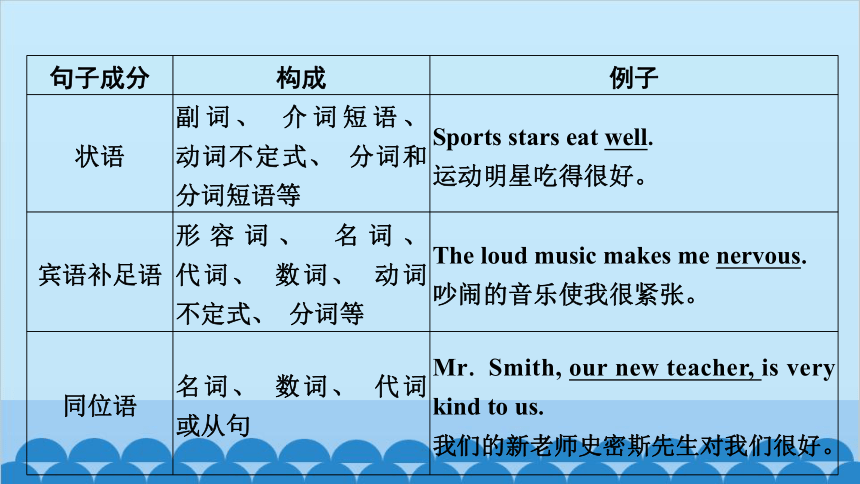
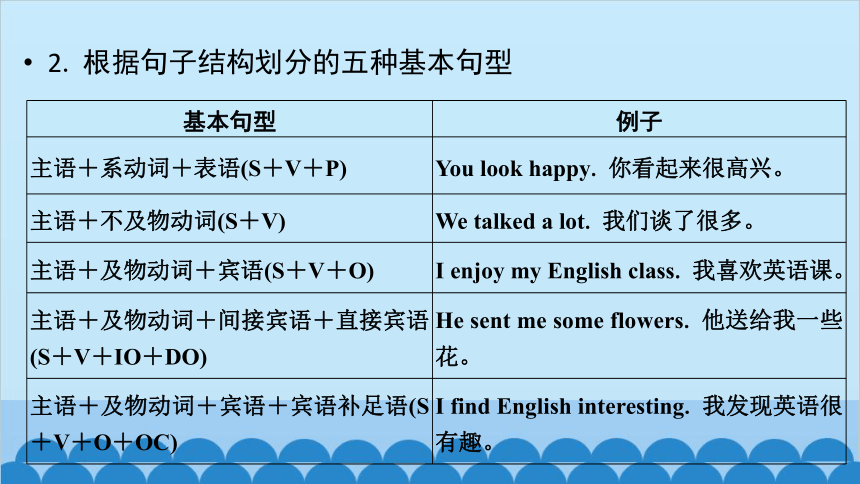
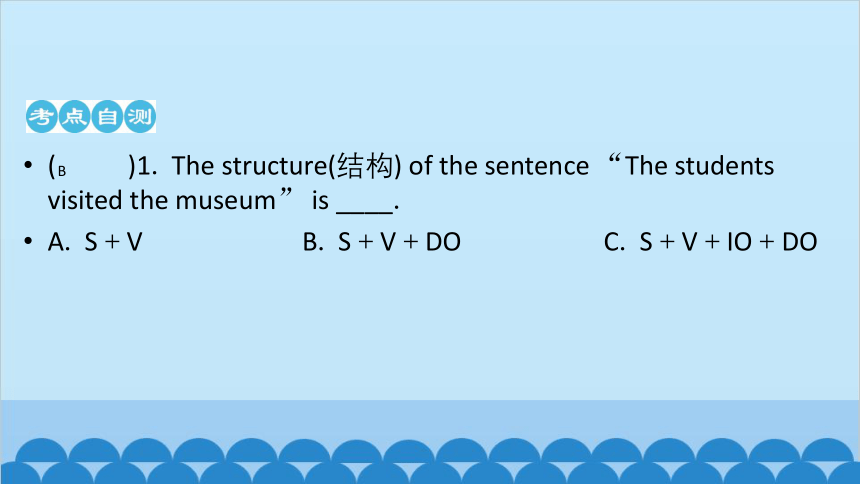
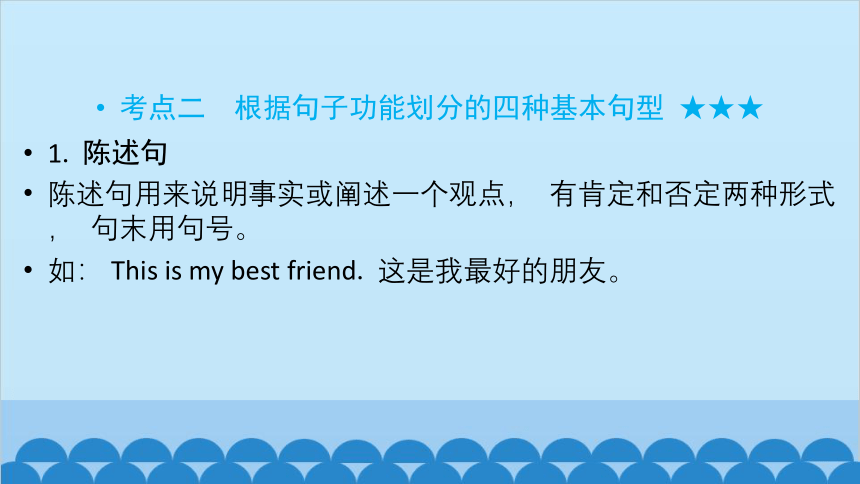

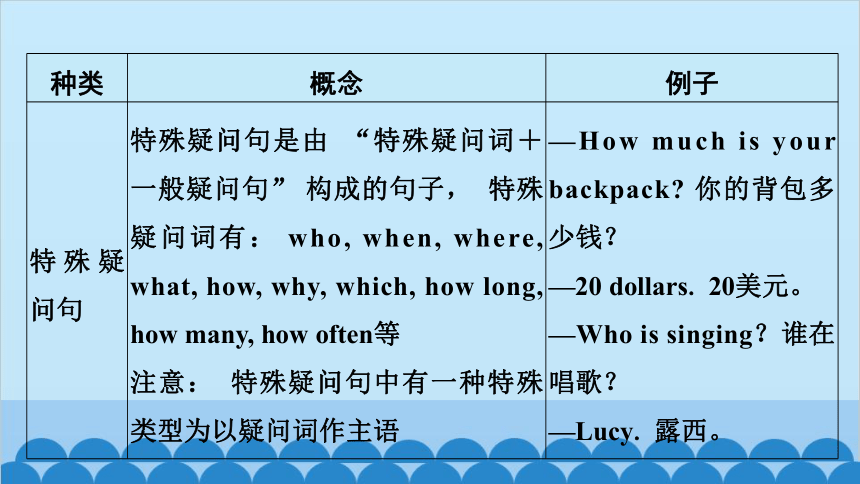
文档简介
(共38张PPT)
第二部分 语法精讲精练
第十一章 句子种类与简单句
知识框架
考情分析
考点梳理
技巧点拨
中考集训
语篇训练
考点 题型
语法选择 短文填空
陈述句 / /
疑问句 / /
祈使句 / /
感叹句 2020(第39题how) 2022(第67题 how)
There be句型 / /
分析: 2020年和2022年均涉及了how引导的感叹句的考查, 而2022年更是将感叹句与宾从相结合进行考查。 另外, 读写综合题中的回答问题和书面表达也都是关于句子结构的考查, 所以掌握好简单句是非常重要的。
考点一 根据句子结构划分的五种基本句型 ★★
1. 句子成分: 主语、 谓语、 宾语、 表语、 定语、 状语、 宾语补足语和同位语。主语和谓语是句子的主体部分。
句子成分 构成 例子
主语 名词、 代词主格、 数词、 动词不定式、 动名词等 I have a stomachache.
我胃痛。
谓语 动词, 一般位于主语之后 He put the book on the table.
他把书放在桌上。
句子成分 构成 例子
宾语 名词、 代词宾格、 数词、 动词不定式、 动名词等 I lost my school ID card.
我丢了校卡。
表语 在连系动词之后的形容词、 名词、 代词、 动词不定式、 介词短语等 My keys are in my schoolbag.
我的钥匙在书包里。
定语 形容词、 代词、 数词、 名词、 动词不定式、 介词短语等 The white model plane is hers.
白色的飞机模型是她的。
句子成分 构成 例子
状语 副词、 介词短语、 动词不定式、 分词和分词短语等 Sports stars eat well.
运动明星吃得很好。
宾语补足语 形容词、 名词、 代词、 数词、 动词不定式、 分词等 The loud music makes me nervous.
吵闹的音乐使我很紧张。
同位语 名词、 数词、 代词或从句 Mr. Smith, our new teacher, is very kind to us.
我们的新老师史密斯先生对我们很好。
2. 根据句子结构划分的五种基本句型
基本句型 例子
主语+系动词+表语(S+V+P) You look happy. 你看起来很高兴。
主语+不及物动词(S+V) We talked a lot. 我们谈了很多。
主语+及物动词+宾语(S+V+O) I enjoy my English class. 我喜欢英语课。
主语+及物动词+间接宾语+直接宾语(S+V+IO+DO) He sent me some flowers. 他送给我一些花。
主语+及物动词+宾语+宾语补足语(S+V+O+OC) I find English interesting. 我发现英语很有趣。
( )1. The structure(结构) of the sentence “The students visited the museum” is ____.
A. S+V B. S+V+DO C. S+V+IO+DO
B
考点二 根据句子功能划分的四种基本句型 ★★★
1. 陈述句
陈述句用来说明事实或阐述一个观点, 有肯定和否定两种形式, 句末用句号。
如: This is my best friend. 这是我最好的朋友。
2. 疑问句
种类 概念 例子
一般疑问句 一般疑问句是把情态动词、 助动词或be动词提到句首, 直接用yes 或no 回答的疑问句 —Does he often take a bus to school 他经常坐公交车去上学吗?
—Yes, he does./No, he doesn't. 是的, 他常坐。/不, 他不常坐。
种类 概念 例子
特殊疑问句 特殊疑问句是由 “特殊疑问词+一般疑问句” 构成的句子, 特殊疑问词有: who, when, where, what, how, why, which, how long, how many, how often等 注意: 特殊疑问句中有一种特殊类型为以疑问词作主语 —How much is your backpack 你的背包多少钱?
—20 dollars. 20美元。
—Who is singing?谁在唱歌?
—Lucy. 露西。
种类 概念 例子
选择疑问句 选择疑问句是由 “一般疑问句/特殊疑问句+or+供选择的部分” 构成的句子, 不能用yes 或no 进行简单回答 —Is the girl with short hair from America or England
那个留短发的女孩来自美国还是英国?
—She is from America. 她来自美国。
—What do you like, apples or pears?你喜欢什么, 苹果还是梨?
—I like pears. 我喜欢梨。
( )2. —____ will the first tramcar(有轨电车) line be finished in Huangshi
—In two or three years.
A. How long B. How soon C. How often
( )3. —Excuse me, ____ is this T-shirt
—It's 88 yuan.
A. how much B. how many C. how long
B
A
3. 祈使句
祈使句是表示请求、 命令、 叮嘱、 邀请、 劝告等的句子。祈使句的主语you往往省略, 谓语动词用原形。
(1)肯定式: 以 “动词原形” 开头。如: Keep quiet, please. 请保持安静。
(2)否定式: ①“Don't+动词原形” 开头。如: Don't eat in the classroom. 不要在教室里吃东西。
②用Never开头: Never+动词原形。如: Never leave today's work for tomorrow!不要把今天的工作留到明天!
(3)Let's引导的祈使句
以Let's开头的句子也是祈使句, 表示陈述和建议。如: Let's have a try! 让我们试一试吧!
( )4. —Sam, ____run in the hallways. It's dangerous.
—Sorry, Ms. Black. 【2022 遂宁改编】
A. do B. don't C. not
B
4. 感叹句
感叹句用来表达强烈的感情, 句末用感叹号(!), 通常由how 或what 引导。
结构: How+形容词/副词(+主语+谓语)!
What+形容词+不可数名词/名词复数(+主语+谓语)!
What+a/an+形容词+单数可数名词(+主语+谓语)!
如: How hot it is today!今天好热啊!
What a nice car (it is)!多漂亮的一辆车啊!
( )5. —Shenzhou XIV carried three Chinese astronauts into space successfully.
—Wow, ____exciting news! 【2022 昆明改编】
A. what B. what a C. how
( )6. —My mother is planning to have a second child next year.
—____ good idea it is. 【2021 玉林改编】
A. What B. How C. What a
A
C
( )7. Hi, Mom moved me to tears(眼泪). ____ touching the movie was! 【2021 盘锦改编】
A. What a B. How a C. How
C
考点三 there be句型 ★★★
1. there be句型的结构: There+be+某人/某物+某地
表示: 某地有某人或者某物(there be没有实际意义)
2. there be句型的各种句式
(1)肯定句: There are some trees in the picture. 照片里有一些树。
(2)否定句: There aren't any trees in the picture. 照片里没有树。(将否定词not放在be 之后)
(3)疑问句: —Are there any trees in the picture?照片里有树吗?(将be 放在there 之前)
—Yes, there are. (No, there aren't.)是的, 有。(不, 没有。)(回答时用yes或no, 后接简单答语)
3. there be句型的各种时态
(1)一般现在时: there is/are
如: There is an apple on the table. 桌子上有一个苹果。
(2)一般过去时: there was/were
如: There was a football match in our school yesterday. 昨天我们学校有一场足球赛。
(3)一般将来时: there is/are going to be或 there will be
如: There will be a class meeting this afternoon. 今天下午有班会。
4. there be句型主谓一致
There be+并列主语结构中, 谓语动词与邻近的主语保持一致, 即 “就近原则”。
如: There is a book and two pens on the desk. (a book 与be动词最近, 故用is) 桌面上有一本书和两支钢笔。
There are two pens and a book on the desk. (two pens与be动词最近, 故用are) 桌面上有两支钢笔和一本书。
5. 辨析 there be 和have/has
there be强调某地存在某物/某人
have/has强调某人拥有某物(强调主语和宾语的所属关系)
如: There are quite a few trees in the school. 学校里有许多树。
I have a lot of good friends. 我有很多好朋友。
( )8. —A pandemic(疫情) broke out in Shaoyang last month.
—Yeah. ____were so many doctors and nurses coming to help us. 【2022 昭阳】
A. They B. There C. Those
( )9. When we walked in, we found that there ____ a blouse and two dresses on the bed.
A. was B. were C. be
B
A
简单句与语法选择
分析句子成分, 判断句子类型, 回忆相应的句子结构, 选出正确答案。
You may not know 67 popular tea is. 【2022 广东】
解析: 分析句子成分可知, 这是一个感叹句作宾从的句子, 而引导词修饰的是形容词 “popular”, 根据感叹句的结构 “What+名词短语+(主语+谓语)”, “How+adj./adv.+主语+谓语” 可以判断, 应填how。
how
39 high my butterfly flies! 【2020 广东】
( )39. A. What B. What a
C. What an D. How
解析: 通过分析句子成分可知, 这是一个感叹句, 而引导词修饰的是副词 “high”。 根据感叹句的结构 “What+名词短语+(主语+谓语)”, “How+adj./adv.+主语+谓语” 可以判断, 应选D。
D
( )1. ____a fresh spring morning it is! 【2022 重庆A卷改编】
A. Who B. How C. What
( )2. ____me. I'll show you the way. 【2022 江西改编】
A. Follow B. To follow C. Following
( )3. —____will Liu Yang stay in the space station this time
—For six months. 【2022 北京改编】
A. How long B. How often C. How much
C
A
A
( )4. —Tell me, Grandma. ____is your favorite person in the whole wide world
—That's easy! It's you! 【2022 扬州改编】
A. What B. Who C. How
( )5. —____do you play volleyball, Amy
—Three days a week. 【2022 连云港改编】
A. How long B. How soon C. How often
B
C
一、 语法选择
Today's story is about a teacher. Long long ago, there 1 a teacher in a small village. He often taught his students in special ways. One day he said to four of his students, “ 2 to a small farm and see apple trees. But you should go in different seasons.” The first student went in winter, the second in spring, the third in summer, and the last in fall.
( )1. A. had B. was C. is
( )2. A. Go B. To go C. Going
B
A
After the four students came back, the teacher called them together. They described their feelings to the teacher. The first student said that there 3 no leaves on the trees. “ 4 disappointed I was!” The second student disagreed, “ 5 are you talking about My eyes were full of green. It made me feel hopeful.”
( )3. A. are B. was C. were
( )4. A. What B. What a C. How
( )5. A. What B. When C. Which
C
C
A
( )6. A. What B. What a C. How
( )7. A. to imagine B. imagine C. imagining
A
B
The third one couldn't wait to say, “ 6 pretty trees they were! I felt so relaxed. The sweet smell of the flowers spread here and there, attracting(吸引) many bees and butterflies.” Hearing these words, the last one shook his head. He said, “Just 7 the trees are full of apples. I am so happy to stay among the trees.”
The teacher smiled and told his students none of them were wrong, but each just saw one season. He continued, “The trees 8 the same in different seasons. 9 can you judge(评价) a tree by only one season?”
Everything has different sides in our life. 10 try to make a conclusion(结论) in a hurry before you see the whole of it.
( )8. A. does not B. do not C. are not
( )9. A. Who B. What C. How
( )10. A. Don't B. Doesn't C. Not
C
C
A
二、 短文填空
Who do you admire Why Here 1 some different ideas from students.
“I admire the police because they have many hard jobs to do. When they leave home, they don't know if they will return. 2
dangerous their job can be! Every time they get a call or they stop a car, they are very careful because they never know what is going to happen. Mr. Police, 3 to be safe, please!” said Lily.
are
How
remember
“I admire the volunteers at my school. Here 4 something I know about them. First, they help teachers to teach us how to read and write. 5 , they try to make it easier for us to understand what we are learning. When we make mistakes, they don't look down on us. They are very patient with us. 6 a good job they do! I am so glad that these people spend their time helping us,” said Bob.
is
Second
What
“I admire teachers. 7 do I say so Well, most of them are very patient. They often spend many hours in the classroom. They teach us not only knowledge but also how to be a good person. 8
meaningful it is! I admire them and I also want to be a teacher when I grow up. Studying hard is the first step,” said Susan.
Why
How
“I admire firemen, because they are very brave. Every time 9
is a fire, they have to go into burning buildings to save people's lives. Sometimes the smoke is so heavy that they can't see or breathe. Sometimes they 10 not know if they will get out safely, but they still do their best to save others. I really admire them,” said Jack.
there
do
第二部分 语法精讲精练
第十一章 句子种类与简单句
知识框架
考情分析
考点梳理
技巧点拨
中考集训
语篇训练
考点 题型
语法选择 短文填空
陈述句 / /
疑问句 / /
祈使句 / /
感叹句 2020(第39题how) 2022(第67题 how)
There be句型 / /
分析: 2020年和2022年均涉及了how引导的感叹句的考查, 而2022年更是将感叹句与宾从相结合进行考查。 另外, 读写综合题中的回答问题和书面表达也都是关于句子结构的考查, 所以掌握好简单句是非常重要的。
考点一 根据句子结构划分的五种基本句型 ★★
1. 句子成分: 主语、 谓语、 宾语、 表语、 定语、 状语、 宾语补足语和同位语。主语和谓语是句子的主体部分。
句子成分 构成 例子
主语 名词、 代词主格、 数词、 动词不定式、 动名词等 I have a stomachache.
我胃痛。
谓语 动词, 一般位于主语之后 He put the book on the table.
他把书放在桌上。
句子成分 构成 例子
宾语 名词、 代词宾格、 数词、 动词不定式、 动名词等 I lost my school ID card.
我丢了校卡。
表语 在连系动词之后的形容词、 名词、 代词、 动词不定式、 介词短语等 My keys are in my schoolbag.
我的钥匙在书包里。
定语 形容词、 代词、 数词、 名词、 动词不定式、 介词短语等 The white model plane is hers.
白色的飞机模型是她的。
句子成分 构成 例子
状语 副词、 介词短语、 动词不定式、 分词和分词短语等 Sports stars eat well.
运动明星吃得很好。
宾语补足语 形容词、 名词、 代词、 数词、 动词不定式、 分词等 The loud music makes me nervous.
吵闹的音乐使我很紧张。
同位语 名词、 数词、 代词或从句 Mr. Smith, our new teacher, is very kind to us.
我们的新老师史密斯先生对我们很好。
2. 根据句子结构划分的五种基本句型
基本句型 例子
主语+系动词+表语(S+V+P) You look happy. 你看起来很高兴。
主语+不及物动词(S+V) We talked a lot. 我们谈了很多。
主语+及物动词+宾语(S+V+O) I enjoy my English class. 我喜欢英语课。
主语+及物动词+间接宾语+直接宾语(S+V+IO+DO) He sent me some flowers. 他送给我一些花。
主语+及物动词+宾语+宾语补足语(S+V+O+OC) I find English interesting. 我发现英语很有趣。
( )1. The structure(结构) of the sentence “The students visited the museum” is ____.
A. S+V B. S+V+DO C. S+V+IO+DO
B
考点二 根据句子功能划分的四种基本句型 ★★★
1. 陈述句
陈述句用来说明事实或阐述一个观点, 有肯定和否定两种形式, 句末用句号。
如: This is my best friend. 这是我最好的朋友。
2. 疑问句
种类 概念 例子
一般疑问句 一般疑问句是把情态动词、 助动词或be动词提到句首, 直接用yes 或no 回答的疑问句 —Does he often take a bus to school 他经常坐公交车去上学吗?
—Yes, he does./No, he doesn't. 是的, 他常坐。/不, 他不常坐。
种类 概念 例子
特殊疑问句 特殊疑问句是由 “特殊疑问词+一般疑问句” 构成的句子, 特殊疑问词有: who, when, where, what, how, why, which, how long, how many, how often等 注意: 特殊疑问句中有一种特殊类型为以疑问词作主语 —How much is your backpack 你的背包多少钱?
—20 dollars. 20美元。
—Who is singing?谁在唱歌?
—Lucy. 露西。
种类 概念 例子
选择疑问句 选择疑问句是由 “一般疑问句/特殊疑问句+or+供选择的部分” 构成的句子, 不能用yes 或no 进行简单回答 —Is the girl with short hair from America or England
那个留短发的女孩来自美国还是英国?
—She is from America. 她来自美国。
—What do you like, apples or pears?你喜欢什么, 苹果还是梨?
—I like pears. 我喜欢梨。
( )2. —____ will the first tramcar(有轨电车) line be finished in Huangshi
—In two or three years.
A. How long B. How soon C. How often
( )3. —Excuse me, ____ is this T-shirt
—It's 88 yuan.
A. how much B. how many C. how long
B
A
3. 祈使句
祈使句是表示请求、 命令、 叮嘱、 邀请、 劝告等的句子。祈使句的主语you往往省略, 谓语动词用原形。
(1)肯定式: 以 “动词原形” 开头。如: Keep quiet, please. 请保持安静。
(2)否定式: ①“Don't+动词原形” 开头。如: Don't eat in the classroom. 不要在教室里吃东西。
②用Never开头: Never+动词原形。如: Never leave today's work for tomorrow!不要把今天的工作留到明天!
(3)Let's引导的祈使句
以Let's开头的句子也是祈使句, 表示陈述和建议。如: Let's have a try! 让我们试一试吧!
( )4. —Sam, ____run in the hallways. It's dangerous.
—Sorry, Ms. Black. 【2022 遂宁改编】
A. do B. don't C. not
B
4. 感叹句
感叹句用来表达强烈的感情, 句末用感叹号(!), 通常由how 或what 引导。
结构: How+形容词/副词(+主语+谓语)!
What+形容词+不可数名词/名词复数(+主语+谓语)!
What+a/an+形容词+单数可数名词(+主语+谓语)!
如: How hot it is today!今天好热啊!
What a nice car (it is)!多漂亮的一辆车啊!
( )5. —Shenzhou XIV carried three Chinese astronauts into space successfully.
—Wow, ____exciting news! 【2022 昆明改编】
A. what B. what a C. how
( )6. —My mother is planning to have a second child next year.
—____ good idea it is. 【2021 玉林改编】
A. What B. How C. What a
A
C
( )7. Hi, Mom moved me to tears(眼泪). ____ touching the movie was! 【2021 盘锦改编】
A. What a B. How a C. How
C
考点三 there be句型 ★★★
1. there be句型的结构: There+be+某人/某物+某地
表示: 某地有某人或者某物(there be没有实际意义)
2. there be句型的各种句式
(1)肯定句: There are some trees in the picture. 照片里有一些树。
(2)否定句: There aren't any trees in the picture. 照片里没有树。(将否定词not放在be 之后)
(3)疑问句: —Are there any trees in the picture?照片里有树吗?(将be 放在there 之前)
—Yes, there are. (No, there aren't.)是的, 有。(不, 没有。)(回答时用yes或no, 后接简单答语)
3. there be句型的各种时态
(1)一般现在时: there is/are
如: There is an apple on the table. 桌子上有一个苹果。
(2)一般过去时: there was/were
如: There was a football match in our school yesterday. 昨天我们学校有一场足球赛。
(3)一般将来时: there is/are going to be或 there will be
如: There will be a class meeting this afternoon. 今天下午有班会。
4. there be句型主谓一致
There be+并列主语结构中, 谓语动词与邻近的主语保持一致, 即 “就近原则”。
如: There is a book and two pens on the desk. (a book 与be动词最近, 故用is) 桌面上有一本书和两支钢笔。
There are two pens and a book on the desk. (two pens与be动词最近, 故用are) 桌面上有两支钢笔和一本书。
5. 辨析 there be 和have/has
there be强调某地存在某物/某人
have/has强调某人拥有某物(强调主语和宾语的所属关系)
如: There are quite a few trees in the school. 学校里有许多树。
I have a lot of good friends. 我有很多好朋友。
( )8. —A pandemic(疫情) broke out in Shaoyang last month.
—Yeah. ____were so many doctors and nurses coming to help us. 【2022 昭阳】
A. They B. There C. Those
( )9. When we walked in, we found that there ____ a blouse and two dresses on the bed.
A. was B. were C. be
B
A
简单句与语法选择
分析句子成分, 判断句子类型, 回忆相应的句子结构, 选出正确答案。
You may not know 67 popular tea is. 【2022 广东】
解析: 分析句子成分可知, 这是一个感叹句作宾从的句子, 而引导词修饰的是形容词 “popular”, 根据感叹句的结构 “What+名词短语+(主语+谓语)”, “How+adj./adv.+主语+谓语” 可以判断, 应填how。
how
39 high my butterfly flies! 【2020 广东】
( )39. A. What B. What a
C. What an D. How
解析: 通过分析句子成分可知, 这是一个感叹句, 而引导词修饰的是副词 “high”。 根据感叹句的结构 “What+名词短语+(主语+谓语)”, “How+adj./adv.+主语+谓语” 可以判断, 应选D。
D
( )1. ____a fresh spring morning it is! 【2022 重庆A卷改编】
A. Who B. How C. What
( )2. ____me. I'll show you the way. 【2022 江西改编】
A. Follow B. To follow C. Following
( )3. —____will Liu Yang stay in the space station this time
—For six months. 【2022 北京改编】
A. How long B. How often C. How much
C
A
A
( )4. —Tell me, Grandma. ____is your favorite person in the whole wide world
—That's easy! It's you! 【2022 扬州改编】
A. What B. Who C. How
( )5. —____do you play volleyball, Amy
—Three days a week. 【2022 连云港改编】
A. How long B. How soon C. How often
B
C
一、 语法选择
Today's story is about a teacher. Long long ago, there 1 a teacher in a small village. He often taught his students in special ways. One day he said to four of his students, “ 2 to a small farm and see apple trees. But you should go in different seasons.” The first student went in winter, the second in spring, the third in summer, and the last in fall.
( )1. A. had B. was C. is
( )2. A. Go B. To go C. Going
B
A
After the four students came back, the teacher called them together. They described their feelings to the teacher. The first student said that there 3 no leaves on the trees. “ 4 disappointed I was!” The second student disagreed, “ 5 are you talking about My eyes were full of green. It made me feel hopeful.”
( )3. A. are B. was C. were
( )4. A. What B. What a C. How
( )5. A. What B. When C. Which
C
C
A
( )6. A. What B. What a C. How
( )7. A. to imagine B. imagine C. imagining
A
B
The third one couldn't wait to say, “ 6 pretty trees they were! I felt so relaxed. The sweet smell of the flowers spread here and there, attracting(吸引) many bees and butterflies.” Hearing these words, the last one shook his head. He said, “Just 7 the trees are full of apples. I am so happy to stay among the trees.”
The teacher smiled and told his students none of them were wrong, but each just saw one season. He continued, “The trees 8 the same in different seasons. 9 can you judge(评价) a tree by only one season?”
Everything has different sides in our life. 10 try to make a conclusion(结论) in a hurry before you see the whole of it.
( )8. A. does not B. do not C. are not
( )9. A. Who B. What C. How
( )10. A. Don't B. Doesn't C. Not
C
C
A
二、 短文填空
Who do you admire Why Here 1 some different ideas from students.
“I admire the police because they have many hard jobs to do. When they leave home, they don't know if they will return. 2
dangerous their job can be! Every time they get a call or they stop a car, they are very careful because they never know what is going to happen. Mr. Police, 3 to be safe, please!” said Lily.
are
How
remember
“I admire the volunteers at my school. Here 4 something I know about them. First, they help teachers to teach us how to read and write. 5 , they try to make it easier for us to understand what we are learning. When we make mistakes, they don't look down on us. They are very patient with us. 6 a good job they do! I am so glad that these people spend their time helping us,” said Bob.
is
Second
What
“I admire teachers. 7 do I say so Well, most of them are very patient. They often spend many hours in the classroom. They teach us not only knowledge but also how to be a good person. 8
meaningful it is! I admire them and I also want to be a teacher when I grow up. Studying hard is the first step,” said Susan.
Why
How
“I admire firemen, because they are very brave. Every time 9
is a fire, they have to go into burning buildings to save people's lives. Sometimes the smoke is so heavy that they can't see or breathe. Sometimes they 10 not know if they will get out safely, but they still do their best to save others. I really admire them,” said Jack.
there
do
同课章节目录
- 词法
- 名词
- 动词和动词短语
- 动词语态
- 动词时态
- 助动词和情态动词
- 非谓语动词
- 冠词
- 代词
- 数词和量词
- 形容词副词及其比较等级
- 介词和介词短语
- 连词和感叹词
- 构词法
- 相似、相近词比较
- 句法
- 陈述句
- 一般疑问句和否定疑问句
- 特殊疑问句及选择疑问句
- 反意疑问句
- 存在句(There be句型)
- 宾语从句
- 定语从句
- 状语从句
- 主谓一致问题
- 简单句
- 并列句
- 复合句
- 主谓一致
- 主、表语从句
- 名词性从句
- 直接引语和间接引语
- 虚拟语气
- 感叹句
- 强调句
- 倒装句
- 祈使句
- 句子的成分
- 句子的分类
- 题型专区
- 单项选择部分
- 易错题
- 完形填空
- 阅读理解
- 词汇练习
- 听说训练
- 句型转换
- 补全对话
- 短文改错
- 翻译
- 书面表达
- 任务型阅读
- 语法填空
- 其他资料
